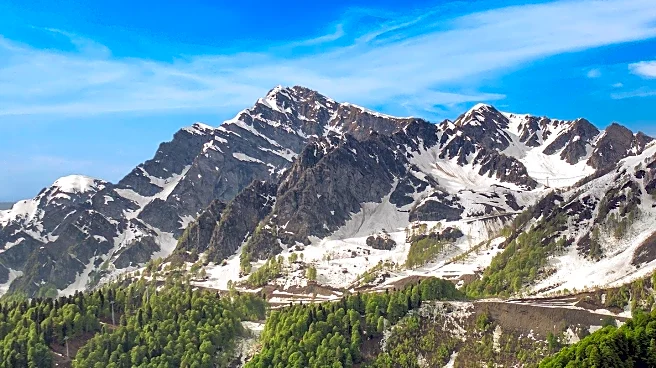What's Happening?
The Italian Alps, particularly the Aosta Valley, are becoming a popular summer destination, offering a variety of outdoor activities such as hiking, cycling, and rafting. The region, known for its winter sports, transforms in the warmer months, providing breathtaking vistas and fresh mountain air. Visitors can explore the Rutor waterfalls trail, soak in thermal baths, and enjoy panoramic views from the Mont Blanc Skyway. The area also offers luxurious accommodations like the Montana Lodge & Spa Mont Blanc, blending Nordic aesthetics with Italian flair. Despite the summer appeal, the Alps are facing significant challenges due to climate change, with glaciers melting at alarming rates.
Why It's Important?
The shift in tourism from winter to summer in the Italian Alps highlights the region's adaptability and resilience in the face of climate change. As glaciers continue to melt, the Alps are losing their traditional winter appeal, prompting a reevaluation of tourism strategies. This transformation not only impacts local economies but also raises awareness about the environmental challenges facing mountainous regions. The increased summer tourism could provide economic relief to areas affected by reduced winter sports activities, while also emphasizing the need for sustainable practices to preserve the natural beauty and biodiversity of the Alps.
What's Next?
As climate change continues to affect the Alps, local governments and businesses may need to invest in sustainable tourism practices and infrastructure to accommodate the growing number of summer visitors. This could include developing eco-friendly accommodations, promoting conservation efforts, and enhancing transportation options to reduce environmental impact. Additionally, there may be increased collaboration between countries sharing the Alpine region to address climate challenges collectively. The focus on summer tourism could also lead to new marketing strategies aimed at attracting visitors interested in outdoor activities and wellness experiences.
Beyond the Headlines
The melting of Alpine glaciers is a stark reminder of the broader impacts of climate change, affecting not only tourism but also water resources and ecosystems. The loss of glaciers could lead to changes in river flows, impacting agriculture and hydroelectric power generation. Furthermore, the cultural identity of Alpine communities, traditionally centered around winter sports, may evolve as they adapt to new environmental realities. This shift could influence local traditions, cuisine, and lifestyle, as communities embrace the opportunities and challenges presented by a changing climate.










